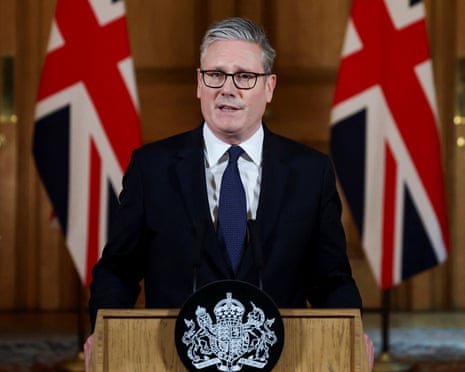Top Stories
UK to Recognize Palestinian State Before UN Meeting in September

The UK government has announced plans to recognize the state of Palestine before the next United Nations General Assembly meeting in September 2024. This decision follows intense pressure from over 250 Members of Parliament, including cabinet ministers, urging Prime Minister Keir Starmer to take a definitive stance on the issue amid the ongoing humanitarian crisis in Gaza.
Shift in Leadership and Policy
Just a week prior, Prime Minister Starmer had dismissed calls to formally recognize Palestine, stating that the timing was not right. He expressed concern for the dire situation in Gaza but refrained from committing to any significant action. Opinion polls indicated that a majority of the UK public supported recognition, but Starmer maintained a cautious approach, prioritizing stability over immediate action.
Following an emergency cabinet meeting focused on the Gaza crisis, the UK government shifted its position dramatically. The readout from the meeting made it clear that recognition of Palestine would occur unless Israel committed to a ceasefire, allowed substantial aid into Gaza, and engaged in serious peace negotiations. Starmer emphasized that the UK could no longer remain passive while humanitarian disasters unfolded.
In a subsequent media statement at Downing Street, Starmer reiterated that the time for action had arrived. He underscored that recognition could come sooner rather than later, contingent upon Israel’s response. The Prime Minister’s remarks indicated a desire for accountability from both Palestinian and Israeli leaders, urging Hamas to release hostages and for Benjamin Netanyahu to act in good faith.
International Implications and Historical Context
As Starmer made his announcement, David Lammy, the UK’s Foreign Secretary, addressed the United Nations, echoing the government’s commitment to recognizing Palestine. Lammy highlighted the historical obligation of the UK, referencing the Balfour Declaration and the nation’s role in the establishment of a Jewish homeland. He stated that the UK also had a responsibility to acknowledge the rights of the Palestinian people.
“I feel the hand of history on our shoulders,” Lammy said, invoking a phrase reminiscent of past peace processes.
This shift in policy marks a significant moment for the UK in its foreign relations and could reshape its role in the Israeli-Palestinian conflict. The government’s recognition of Palestine is seen as a response to both public sentiment and international calls for action, especially in light of multiple UN resolutions demanding an end to violence and humanitarian aid access.
The recent developments have sparked discussions regarding the UK’s historical commitments and the need for a balanced approach to the Israeli-Palestinian conflict. Critics argue that the government could have taken this step earlier, but Starmer has demonstrated a preference for a methodical approach, ensuring thorough consideration before making bold policy moves.
In a week that showcased a pivotal shift in leadership, Starmer has positioned himself as a key player on the global stage, navigating complex international dynamics while responding to pressing humanitarian needs. The upcoming months will be crucial as the UK seeks to implement its commitment and engage with both Israeli and Palestinian leaders towards a sustainable resolution.
-

 Health3 months ago
Health3 months agoNeurologist Warns Excessive Use of Supplements Can Harm Brain
-

 Health4 months ago
Health4 months agoFiona Phillips’ Husband Shares Heartfelt Update on Her Alzheimer’s Journey
-

 Science2 months ago
Science2 months agoBrian Cox Addresses Claims of Alien Probe in 3I/ATLAS Discovery
-

 Science2 months ago
Science2 months agoNASA Investigates Unusual Comet 3I/ATLAS; New Findings Emerge
-

 Science2 months ago
Science2 months agoScientists Examine 3I/ATLAS: Alien Artifact or Cosmic Oddity?
-

 Entertainment2 months ago
Entertainment2 months agoLewis Cope Addresses Accusations of Dance Training Advantage
-

 Entertainment5 months ago
Entertainment5 months agoKerry Katona Discusses Future Baby Plans and Brian McFadden’s Wedding
-

 Science2 months ago
Science2 months agoNASA Investigates Speedy Object 3I/ATLAS, Sparking Speculation
-

 Entertainment5 months ago
Entertainment5 months agoEmmerdale Faces Tension as Dylan and April’s Lives Hang in the Balance
-

 World3 months ago
World3 months agoCole Palmer’s Cryptic Message to Kobbie Mainoo Following Loan Talks
-

 World4 weeks ago
World4 weeks agoBailey and Rebecca Announce Heartbreaking Split After MAFS Reunion
-

 Science2 months ago
Science2 months agoNASA Scientists Explore Origins of 3I/ATLAS, a Fast-Moving Visitor









